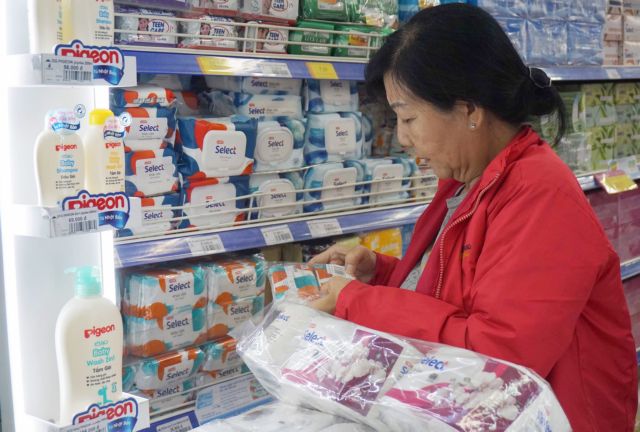Supermarkets in HCM City have worked with suppliers to ensure there is sufficient supply of goods at steady prices for the next two to three months, diminishing public fear of shortages.

Supermarkets in HCM City have worked with suppliers to ensure there is sufficient supply of goods at steady prices for the next two to three months, diminishing public fear of shortages.
Since Friday night, when the 17th COVID-19 case was reported in Ha Noi, residents in the capital as well as HCM City and elsewhere have been flocking to supermarkets and retail outlets to stock up on essentials like rice, instant noodles and soap, temporarily emptying shelves.
But on Sunday (March 8), the number of shoppers decreased significantly at supermarkets but was still higher than on previous Sundays.
Nguyen Anh Duc, permanent deputy general director of Saigon Co.op, which owns Co.opmart and Co.opXtra supermarket chains, said there was no panic buying like on Friday and Saturday when the number of shoppers was 20 times the normal number.
He was "relieved” as operations were back to normal, he said.
Saigon Co.op began plans to stockpile goods since last month and so stocks are plentiful and would easily meet the soaring demand, he said.
Its stockpile to ride out the epidemic is equal to its Lunar New Year stocks, with a focus on rice, instant noodles, water, canned food, milk, hand sanitisers, face masks, toilet paper, liquid cleaners and others, he said.
Saigon Co.op has dispatched adequate stocks not only to its stores in HCM City but also in Ha Noi and the central region.
A spokesperson for MM Mega Market Viet Nam Co., Ltd said the supermarket chain has been doing a number of things to ensure it could meet all customer demands for essential goods.
Right from the beginning of this year, it has worked with suppliers and farmers to increase supply by 20 – 40 per cent, she said.
It is working closely with suppliers to increase the number of vehicles delivering goods to its centres, especially in the north, to preclude a shortage and price hikes, she said.
It has increased stocks of rice, processed and fresh foods and others by over VND1.2 trillion (US$51.7 million), especially products to help ward off infection like face masks, hand sanitisers and antiseptic liquids, whose supply has been increased by 190-1,500 per cent, she said.
Big C has also increased stocks by three to four times.
Nguyen Thi Phuong, deputy general director of Central Retail Group, owner of the Big C supermarket network in the country, said suppliers have been told to increase delivery frequency and the number of staff has been increased to better serve customers.
Many retailers have also cut the prices of many products.
Giant food company VISSAN, for instance, is offering a 7 per cent discount on several products like beef ball, pork braised with eggs and coconut water, dried chicken with lemon leaves, and dried pork with seaweed at its stores until March 19.
Nguyen Huynh Trang, deputy director of the city Department of Industry and Trade, said producers and retailers have assured that stocks of goods are plentiful and enough for the next two or three months.
The public should therefore not hoard goods, causing confusion and distorting the market, she said.
Back to normal
Stores in Ha Noi witnessed a flurry of activity on March 7, with shoppers buying up essential goods after the city recorded its first cases of COVID-19. The next morning, however, supermarkets and shops in the city were mostly back to normal – full of products with stable prices.
During a meeting of the steering committee on Covid-19 in Ha Noi on Sunday, deputy director of Ha Noi Department of Industry and Trade Tran Thi Phuong Lan said: “Activities at all supermarkets and traditional markets have returned to normal and there are no price hikes.”
Lan said since the beginning of last month, the department has worked hard to stabilise the prices of commodities.
Lan’s department has directed distribution channels to increase their supply by a further 30 to 50 per cent and prepare employees for extra hours as needed.
On March 8, the department and the city’s market watch team checked both supermarkets and traditional markets. According to preliminary statistics, prices of commodities such as rice, pork and vegetables have returned to normal, with little fluctuation.
Among commodities, face masks, especially antibacterial cloth ones, have been checked carefully at workshops, supermarkets and traditional markets to ensure quality for users.
Speaking at the meeting, chairman of the City People's Committee Nguyen Duc Chung said: “The hoarding goods is not necessary because supermarkets in the city will always serve them.”
Chung requested relevant producers and distributors prepare more goods as well as hand cleansers and face masks to serve the needs of people.
Talking to Viet Nam News, Nguyen Phuong Mai, 33, said: "It is so funny to see my mother-in-law try her best to buy a small zucchini for VND60,000, three times more expensive than it often costs, at the local market."
The woman said: "It is so unnecessary. There is a lot of food available in the supermarket. A few days ago, we still had to buy to help the farmers who could not sell their products." — VNS





